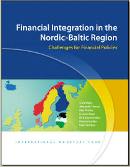IMF Policy Seminar on Financial Integration in the Nordic-Baltic Region
International Monetary FundWashington, DC
June 5, 2007
This seminar aimed to provide an opportunity for Executive Directors and staff to discuss a staff policy paper on "Financial Integration in the Nordic-Baltic Region", and benefit from the views of external observers. The seminar was chaired by Deputy Managing Director Takatoshi Kato, and panelists included Professor Clas Wihlborg, from the Copenhagen Business School, Onno de Beaufort Wijnholds, ECB Representative to the IMF, and Jaime Caruana, Director of the IMF's Monetary and Capital Markets Departments.
The paper summarizes the main findings of the Nordic-Baltic Regional Financial Sector Project, which took place over 2006-2007. It takes stock of financial sector developments, focusing on the integration of the financial services industry in the region. Furthermore, the paper, which has "Challenges for Financial Sector Policies" as its subtitle, highlights gaps in the policy frameworks dealing with financial integration, discusses the authorities' responses to the challenges presented by these gaps, and presents several policy options going forward.
The Nordic-Baltic project is part of the IMF's effort to deepen its work on the financial sector, as reflected in the institution's Medium Term Strategy. The exercise focuses on cross-border financial sector issues in the region. Globalization and integration in Europe have opened opportunities for financial entities to expand abroad and turn into large cross-border financial conglomerates, and the structure of cross-border financial institutions is also changing.
A key issue is presented by the emergence of large cross-border conglomerates with subsidiaries or branches that might be of systemic importance in a number of host countries. This development poses considerable challenges for financial policies. These concern home-host supervisory, safety net and crisis management arrangements. The paper details the regional and EU-wide structures in place for addressing these issue and the gaps in them. Effective oversight of cross-border large and complex financial institutions is on the minds of policy makers in Europe and remains very much work in progress. The Nordic-Baltic experience could provide useful lessons in this regard.
Although the project was initially undertaken principally as a stocktaking exercise, the paper offers some suggestions for the future direction of policies in the Nordic-Baltic region, and Europe more broadly. In particular, given the fast pace of financial sector development within the region, the project reviews the arrangements for cross-border oversight and crisis management and highlights gaps that may have arisen as a result of growing financial integration in the region. The current paper also offers some tentative suggestions for actions that could be taken to address these gaps and points to areas where more work is needed on specific developing recommendations. Since financial integration is also increasing in Europe as a whole, and most countries in the Nordic-Baltic region are also bound by the European regulatory framework, addressing these challenges may need to be considered in this broader European-wide context.
The seminar was organized jointly by the IMF's Monetary and Capital Markets Department and External Relations Department.


